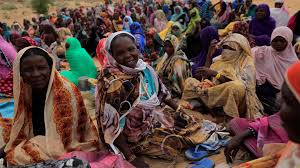By Aweye Teddy Onam
United Nations Office for the Coordination of Humanitarian Affairs (OCHA) has reported a sharp increase in new arrivals at the Renk Transit Centre fleeing the raging in Sudan.
OCHA, in a statement released yesterday seen by this outlet, said the increase in numbers of refugees and returnees is causing overcrowding at the Renk Transit Center border entry point.
It disclosed that almost 15,000 individuals are already estimated to be residing at the transit center in dire humanitarian situations.
“Protection concerns persist with a shortage of emergency shelters and the transit site extension construction progressing slowly due to funding shortages,” it stated.
The situation is expected to worsen as people continue to arrive and the relocation of refugees to Maban remains on hold due to the heavy rainfall causing floods, said the humanitarian agency.
According to OCHA, the border monitoring teams observed a 49 percent increase in new arrivals this week, reaching Joda border town in Renk County, Upper Nile. 63 percent are Sudanese refugees seeking asylum and security.
“On October 27, over 3,000 individuals and 531 households were recorded at the Joda border, and the reasons for the increase include the deteriorating security situation in Sudan, limited access to services, and fears of an escalation of conflict in other parts of Sudan, including Kosti and nearby areas, as shared by new arrivals,” OCHA noted.
Meanwhile, the UN agency said, according to the recent headcount and intention survey by partners, 3,405 individuals were recorded, representing a significant decrease from 7,879 individuals in September in Bulukat Transit Centres in Malakal.
Over one million people have reportedly been displaced from Sudan to neighboring countries since the start of the war in mid-April, of whom 364,818 arrived in South Sudan as of 7th November, this year.
OCHA further noted that out of the aforementioned figure, 83 percent are South Sudanese returnees and 16 percent are Sudanese refugees.
The percentage of Sudanese refugees has doubled from 8 percent in early October, indicating a significant increase in Sudanese refugees in the past few days.
The humanitarian agency said of the 22 monitored points of entry (PoEs) since the start of the crisis, over 99 percent of the arrivals have come through just three PoEs, with 83 percent arriving through Wunthow/Joda (near Renk) in Upper Nile.
16 percent through Panakuach in Unity, 1 percent through Kir Adem in Northern Bahr el Ghazal, and the rest (less than 1 percent) through Western Bahr el Ghazal and the Abyei Administrative Area.
Upper Nile State migration officers in Renk reported limited border control between Sudan and South Sudan, which they worry may trigger security incidents in the future.
A food security, livelihoods, and nutrition assessment conducted by WFP among newly arrived returnees from Sudan between July 22 and August 28 indicated that 90 percent of returnee families face moderate or severe food insecurity.
In addition, screening data from the border crossings revealed that 20 percent of children under age 5 and over a quarter of pregnant and lactating women (PLW) were acutely malnourished.
“Of the total number of new arrivals in South Sudan, 329,454 people received high-energy biscuits, in-kind food, or cash assistance. Partners continue to work on providing three-month food assistance to returnees in their final destinations.”
UNOCHA stated that transportation has been provided to 15,089 South Sudanese returnees, including 13,732 people from the Joda border crossing to the Renk TC and the port; 1,451 people from Renk to Malakal by boat; and 1,906 returnees from Malakal to Wau, Rubkona, Yida, and Juba by air.
Also, each returnee reportedly received US$20 in cash to support their last-mile transportation to their different destinations.
The recently concluded talks in Jeddah, Saudi Arabia, which were co-facilitated by the Intergovernmental Government Authority on Development (IGAD), the United States, and Saudi Arabia elapsed without a truce.
The Sudanese warring factions have failed to agree to a ceasefire but have recommitted to the provision of humanitarian access and confidence-building measures.




